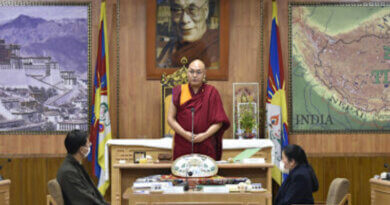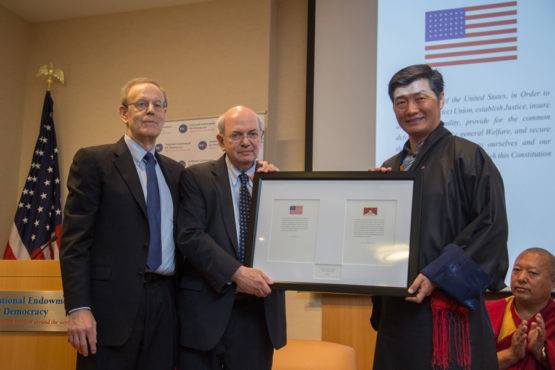Sikyong Penpa Tsering in mid-end of Latin America, US official Tour: Met US Senator Mitt Romney in US
By Tsering Choephel

DHARAMSALA, 18 Oct: Penpa Tsering, the President (Sikyong) of the Central Tibetan Administration (CTA), is currently on an official tour encompassing Latin America and the United States. During his visit on Tuesday, he met with Mitt Romney, the US senator who was the 2012 Republican Party’s presidential nominee, along with the chairman of the International Campaign for Tibet (ICT) and Hollywood star Richard Gere at the office of Sen. Romney, as reported by Yahoo News.
The report states that the meeting was arranged “to discuss efforts to support basic rights in Tibet.”
Romney is quoted as saying, “Not only does the Chinese Communist Party (CCP) carry out gross human rights abuses on the Tibetan people, but they also aim to erase Tibetan culture completely.”
Sikyong commenced his official tour on 29 September, and it is set to conclude on 24 October. He has concluded his maiden official visits to the South American Countries such as Brazil, Colombo, and Mexico and is currently touring the US.
In Brazil, he was warmly received at the São Paulo Legislative Assembly, where he was greeted by President Andre Prado and Vice President Gil Dinuz. Penpa Tsering appealed to Assembly leadership to approach their policy decisions regarding China and Chinese investment with careful consideration and responsibility, as reported by tibet.net, the official webpage of the CTA. Sikyong also met with Walter Feldman, the Committee’s president, and Francisco Santos, the Committee’s founder, for a discussion on Tibet and the Central Tibetan Administration’s concerns and priorities.
In Colombia, Sikyong addressed the National University of Colombia (UNAL) on the theme of “Exiles and Displacements: Interdisciplinary Reflections” and participated in an inter-religious dialogue, engaging with esteemed religious heads of diverse traditions. The dialogue highlighted the urgent need for global solidarity and support for repressed peoples of various faiths in China, including Tibetan Buddhists, Uyghurs, and Southern Mongolia.
Sikyong reportedly received a ceremonious welcome in the chambers of the Mexican Parliament in the presence of Vice President Deputy Karla Almazán. During his address at Universidad Autonoma Metropolitana (UAM), one of Mexico’s premier universities, he emphasised Latin America’s role in advancing the Tibetan cause given their position as a key actor vis-a-vis China. He urged supporters to institutionalise and organise parliamentary support, ensuring a long-term commitment to the Tibetan cause.
During the tour, Sikyong engaged in discussions on ‘Tibet’ with think tanks, universities, religious heads, members of civil society, Tibet support groups, as well as the Tibetan diaspora community. He emphasized the critical situation inside Tibet, the environmental significance of the Tibetan plateau in relation to global climate change, and the growing influence of China. Sikyong is putting in full efforts to establish new relations and deepen existing ones, aiming to resolve Tibet’s issue.
Currently on tour in the US, a significant supporter of the Tibetan freedom movement with several laws passed in Congress in support of the Tibetan struggle, including the landmark Tibetan Policy and Support Act (2020) and the 2018 Reciprocal Access to Tibet Act, among others.
A new bill on Tibet, the Resolve Tibet Act, was introduced in the US Congress in 2022. Reps. Jim McGovern, D-Mass., and Michael McCaul, R-Texas, introduced the bill in the House on 13 July 2022.
The Resolve Tibet Act, if passed into law, would officially declare that the conflict between Tibet and China remains unresolved and that Tibet’s legal status is yet to be determined under international law. It condemns China for failing to engage in dialogue with the Dalai Lama or CTA and recognises all three provinces of traditional Tibet as legitimate Tibet, among other provisions.
Sikyong, while highlighting the Tibetans’ persistence in seeking peaceful dialogues despite enormous suffering incurred from the CCP, stated, “This bill would allow the United States to back its consistent calls for dialogue with more force and urgency while helping give Tibetans a voice in their own country.”
Richard Gere, who has met with congressional leaders and continues to lobby for the bill, remarked, “It’s setting the record straight. It’s setting history straight. It’s setting our own motivation and making it as pure as it possibly can be that we are there for the Tibetan people.”






